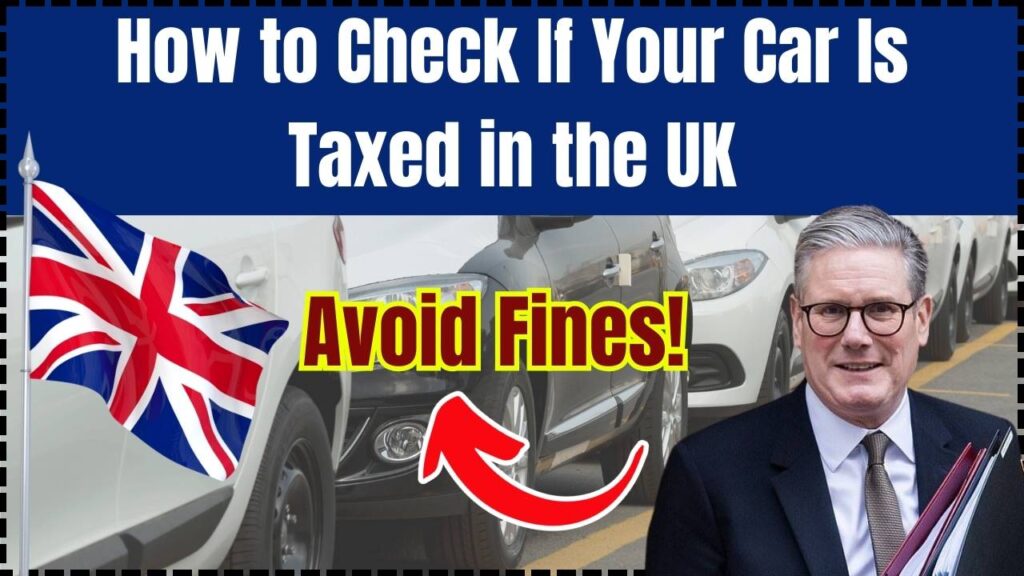How to Check If Your Car Is Taxed in the UK: Ensuring your vehicle is properly taxed is a legal requirement in the UK. Driving an untaxed car can lead to significant fines, vehicle clamping, or even impoundment. This comprehensive guide will walk you through the process of checking your car’s tax status, explain the importance of keeping your vehicle taxed, and provide practical advice to help you stay compliant and avoid penalties.
How to Check If Your Car Is Taxed in the UK?
Ensuring your vehicle is taxed is a legal obligation that carries significant penalties if overlooked. By regularly checking your vehicle’s tax status, understanding the taxation process, and staying informed about upcoming changes, you can avoid fines and keep your vehicle compliant. Utilize the resources provided by the DVLA and set up reminders to stay on top of your vehicle tax responsibilities.

| Aspect | Details |
|---|---|
| How to Check Vehicle Tax Status | Visit the GOV.UK vehicle tax checker and enter your vehicle’s registration number. |
| Consequences of Driving Without Tax | Fines up to £1,000, vehicle clamping, or impoundment. |
| Exemptions | Certain vehicles, such as those used by disabled individuals or historic vehicles (over 40 years old), may be exempt from tax. |
| Upcoming Changes | Starting April 2025, electric vehicles will no longer be exempt from road tax. |
| Official Resources | For detailed information, visit the GOV.UK vehicle tax page and the DVLA Inside Blog. |
Why It’s Important to Keep Your Vehicle Taxed?
Driving an untaxed vehicle is illegal and can result in severe consequences:
- Financial Penalties: You could face fines up to £1,000.
- Vehicle Clamping or Impoundment: Authorities have the power to clamp or seize untaxed vehicles.
- Legal Issues: Continuous non-compliance can lead to court proceedings.
To avoid these issues, it’s crucial to ensure your vehicle is taxed appropriately.
How to Check If Your Car Is Taxed in the UK?
Checking your vehicle’s tax status is a straightforward process:
- Visit the Official Website: Go to the GOV.UK vehicle tax checker.
- Enter Vehicle Details: Input your vehicle’s registration number.
- View Tax Status: The system will display whether your vehicle is currently taxed and provide the expiry date.
This service is available 24/7 and is free to use.
How to Tax Your Vehicle?
If you discover your vehicle is untaxed or nearing its tax expiry, follow these steps to tax your vehicle:
- Gather Necessary Documents:
- V11 Reminder Letter: Sent by the DVLA when your tax is due.
- V5C Registration Certificate (Log Book): If you don’t have a V11, use the V5C.
- Valid MOT Certificate: Required if your vehicle is over three years old.
- Choose a Payment Method:
- Online: The quickest method. Visit the GOV.UK vehicle tax service and follow the prompts.
- Direct Debit: Set up monthly, quarterly, or annual payments.
- Post Office: Visit a local branch that deals with vehicle tax.
- Complete the Process:
- Online: Enter your vehicle’s registration number and reference number from the V11 or V5C.
- Post Office: Bring your documents and payment method.
After completing these steps, your vehicle will be taxed, and you’ll receive confirmation.
Setting Up Tax Reminders
To avoid unintentional lapses in your vehicle tax, consider setting up reminders:
- DVLA Reminder Service: Sign up to receive email or text reminders when your tax is due. This service is free and can be set up through your Driver and Vehicle Licensing Agency (DVLA) account.
Exemptions from Vehicle Tax
Some vehicles are exempt from paying vehicle tax, including:
- Historic Vehicles: Vehicles over 40 years old.
- Vehicles Used by Disabled Individuals: If registered in the disabled tax class.
- Electric Vehicles (EVs): Currently exempt, but this will change in April 2025.
Even if your vehicle is exempt, you must still register it as taxed.
Upcoming Changes to Vehicle Tax
Be aware of upcoming changes:
- Electric Vehicles: Starting April 2025, EVs will no longer be exempt from vehicle tax. Owners will be required to pay the standard rate applicable at that time.
Staying informed about such changes ensures you remain compliant and avoid unexpected fines.
UK Car Tax Check: How to Verify Your Road Tax Status Instantly
MOT Check Made Easy: How to Verify Your Car’s Status Online
£249 Driving Licence Fee? UK Learners Face Backlog – Here’s the Full Story!
Frequently Asked Questions (FAQs)
1. What happens if I don’t tax my vehicle?
Driving an untaxed vehicle can result in fines up to £1,000, vehicle clamping, or impoundment. It’s essential to keep your vehicle taxed to avoid these penalties.
2. Can I drive my car if I’ve just purchased it and it’s not taxed?
No, you must tax the vehicle before driving it. The tax does not automatically transfer from the previous owner.
3. Are there any vehicles exempt from tax?
Yes, certain vehicles, such as those over 40 years old (historic vehicles) and those used by disabled individuals, may be exempt. However, they must still be registered as taxed.
4. How can I set up a tax reminder?
You can sign up for free email or text reminders through your DVLA account.
5. What should I do if I don’t have a V11 reminder letter?
You can use your V5C registration certificate (log book) to tax your vehicle. The 11-digit reference number on the V5C will allow you to complete the process.







